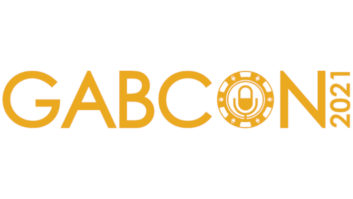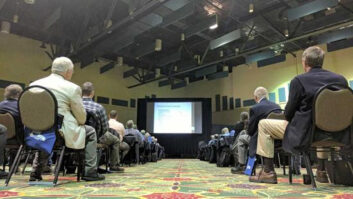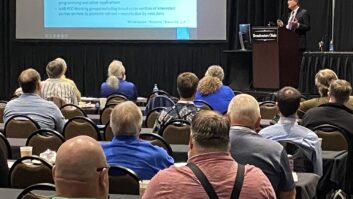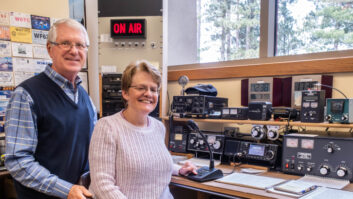
The president-elect and vice-president-elect in an image from the Trump campaign website.
“We are certainly entering into the area of the unknown.”
That’s the understatement of the day and it came from Mark Fratrik, senior VP and chief economist of research firm BIA/Kelsey, who is among the industry people Radio World invited to comment on the implications for radio of Donald Trump’s election.
“It is very unclear what the Trump agenda is for local media,” he told us in an email. “I have not heard or seen any suggestions that he will change any local or national media regulations. Of course, he criticized the AT&T-Time Warner deal during the campaign, though I am not clear how this affects competition. So, I think this proposed deal will go through the regulatory process and will be decided by the DOJ as to whether they will prevent this from happening in a court of law.”
With respect to over-the-air broadcasting, Fratrik said, “it is not clear how a Trump administration could be any worse than the present administration or a Clinton administration. Clearly, there was no enthusiasm at the Obama FCC to loosen up any local or national ownership rules, even the absurd (in 2016) broadcast-newspaper cross ownership rules. So, one could be somewhat ‘more’ hopeful that a Trump FCC with a new chairman would pursue some loosening of local and national ownership rules.”
Broadcast attorney David Oxenford blogged today that “we can only speculate as to what that election will mean for broadcast policy — particularly at the FCC. One would certainly expect a lessening of the regulatory burden on broadcasters — as lessening burdensome regulations on businesses was a clear plank of the Trump agenda. The make-up of the FCC will likely facilitate such changes, as Republicans will no longer be in the minority at the FCC. A third Republican will join Commissioners Pai and O’Rielly on the FCC. These two Republicans dissented on many issues of importance to broadcasters — including the recently concluded Quadrennial Review of the Ownership Rules. Thus, a third Republican vote could have changed the decisions on many issues.”
Oxenford noted recent speculation about a role for conservative scholar Jeffrey Eisenach at the commission. “One of the existing Republican Commissioners will likely become Acting and potentially permanent Chair, and new names for FCC vacancies will likely arise in the near term.” But Oxenford thinks planning for a GOP administration “may well change the thinking about how to proceed on many of the issues now on the table for broadcasters,” such as ownership rules, EEO rules, FCC reform and changes in libel laws. Read Oxenford’s blog.
Communications attorney John Garziglia reminded broadcasters of the power they hold. Broadcasters, Garziglia said, made the Trump brand what it is today. ”Broadcasters are the unique assemblage that can most powerfully sway and threaten Trump in the future.” (Read his comments here.)
Scott Fybush, an industry veteran, Radio World contributor and publisher of a popular tower calendar, reiterated the unknown aspect. “I think we’re all in the dark here. We’ve never had a president come into office with as little experience in the nuts and bolts of government as we’re about to see,” he said.
“The intricacies of FCC regulation probably rank very low on the agenda of any president, but at least there’s usually a bureaucratic framework for them to work within as they take office. I expect the Clinton transition team had some idea who they would have appointed. I have no idea if a Trump transition team even knows they get to appoint FCC commissioners.” At the congressional level, it’s status quo, he noted.
“The biggest concern, then, becomes economic,” Fybush thinks. “As a station broker, an economic downslide would be bad news. Financing is already hard to get for small deals, and a recession would kill what’s been a promising upswing in deal making.”
One reader told RW on Facebook that he thought there had been “a clear ‘lack of respect’ for radio” in the campaigns generally, with an emphasis on digital banner ads on You Tube and political websites. Campaigns were “no longer worried about ‘cost per thousand’ but went for ‘what is sexy or trending,’” he wrote. “We got Trump ads and U.S. Senate ads, but down ballot folks went with ‘internet driven’ ads, not sponsored by radio stations.”
Attorney Harry Cole of Fletcher, Heald & Hildreth, also an RW contributor, said, “It borders on the impossible to speculate just what may be in store for broadcasters and the FCC under a Trump administration. The president-elect has no track record with respect to communications regulation matters and has not yet identified any apparent point-person on the FCC front, as far as I am aware. He utilized a non-specific approach to potential policies that frustrates any effort to foresee likely directions he might take. To the extent that he advocated less regulation generally, that could bode well for broadcasters, particularly since he should have a friendly and supportive Congress.”
The National Association of Broadcasters generally has tried to work with both parties and navigated an agenda that is not recognizably partisan but rather pro-broadcaster, particularly under its current leader. Gordon Smith’s history as a former Republican U.S. senator would presumably bode well for relations between NAB and the White House, though he’s also from Utah where relations between the Trump movement and Mormons have been sticky. NAB issued a brief statement today congratulating the president-elect and the new and returning members of Congress. “We look forward to working with the next administration in support of a pro-innovation and regulatory reform agenda that will allow local broadcasting to flourish and reach every viewer and listener, anywhere and any time.”
The Consumer Technology Association stated, “As President-elect Trump begins work on his economic agenda, we encourage his administration to embrace the Technology Sector Presidential Platform put forward by the technology community. This agenda will help the president-elect pursue our shared goals of stimulating job creation, economic growth and innovation in the U.S. ” President/CEO Gary Shapiro said he hoped the continued Republican majority in the Senate would help Congress “roll back unnecessary rules, tackle high-skilled immigration reform, reduce patent troll extortion, lower corporate taxes and reduce spending.”












